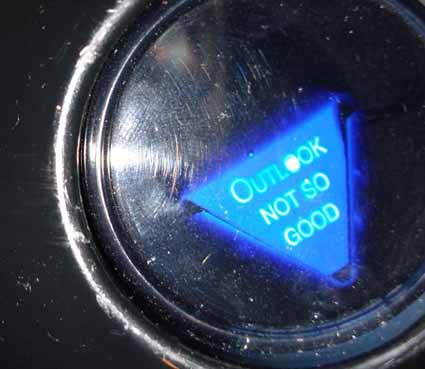Is there a perfect way to teach programming to would-be programmers? Let's ask the
Magic 8-Ball.

Outlook not so good.
Does that mean we shouldn't teach them? Of course not. Does it mean we shouldn't look for better methods of teaching them? Emphatically I say again, "of course not!"
And what of the learner? Should beginners seek to increase their level of skill?
Only if they want to become a level 20
Spaghetti Code Slingmancer (can you imagine the mess?). Or, that's how some make it seem.
 Photo from Ken Stein found via Spaghetti cables @ Geek2Live
Photo from Ken Stein found via Spaghetti cables @ Geek2Live
All it means to me is that we shouldn't let our paranoia about the wrong ways of learning stop us from doing so. For instance, take this passage about the pitfalls of reading source code:
Source code is devoid of context. It's simply a miscellaneous block of instructions, often riddled with a fair bit of implicit assumptions about preconditions, postconditions, and where that code will fit in to the grand scheme of the original author's project. Lacking that information, one can't be sure that the code even does what the author wanted it to do! An experienced developer may be able to apply his insight and knowledge to the code and divine some utility from it ("code scavenging" is waxing in popularity and legitimacy, after all), but a beginner can't do that.
Josh also mentions that source code often lacks rationale behind bad code or what might be considered stupid decisions, and that copy and paste is no way to learn.
They're all valid points, but the conclusion is wrong.
Which one of us learned the craft without having read source code as a beginner? Even the author admits that he was taught that way:
Self-learning is what drives the desire to turn to source code as an educational conduit. I have no particular problem with self-learning -- I was entirely self-taught for almost three quarters of what would have been my high school career. But there are well-known dangers to that path, most notably the challenge of selecting appropriate sources of knowledge for a discipline when you are rather ill-informed about that selfsame discipline. The process must be undertaken with care. Pure source code offers no advantages and so many pitfalls that it is simply never a good choice.
This is a common method of teaching - "do as I say, not as I do." It's how we teach beginners anything, because their simple minds cannot grasp all the possible combinations of choices which lead to the
actual Right Way to do something. It's a fine way to teach.
But I'd wager that for all X in S = {good programmers}, X started out as a beginner reading source code from other people. And X probably stumbled through the same growing pains we all stumble through, and wrote the same crapcode we all do.
Of course, there are many more bad programmers than good, so lets not make another wrong conclusion - that any method of learning will invariably produce good programmers.
Instead, let's acknowledge that programming is difficult as compared to many other pursuits, and that there's not going to be a perfect way to learn. Let's acknowledge that those who will become good programmers will do so with encouragement and constant learning. Instead of telling them how they should learn, let them learn in the ways that interest them, and let's guide them with the more beneficial ways when they are open to it.
Let's remember that learning is good, encourage it, and direct it when we can. But let people make mistakes.
Learning in the wrong manner will produce good programmers, bad programmers, and mediocre ones.
Independent, orthogonal, and irrelevant are all words that come to mind. The worst it will do is temporarily delay someone from reaching their desired level of skill.
I would be knowledgeable having read programming books with no practical experience. But I wouldn't have any understanding.
Making mistakes is fundamental to understanding. Without doing so, we create a bunch of
angry monkeys, all of whom "know" that taking the banana is "wrong," but none of whom know why.
What do you think?
Hey! Why don't you make your life easier and subscribe to the full post
or short blurb RSS feed? I'm so confident you'll love my smelly pasta plate
wisdom that I'm offering a no-strings-attached, lifetime money back guarantee!
Leave a comment
There are no comments for this entry yet.
Leave a comment